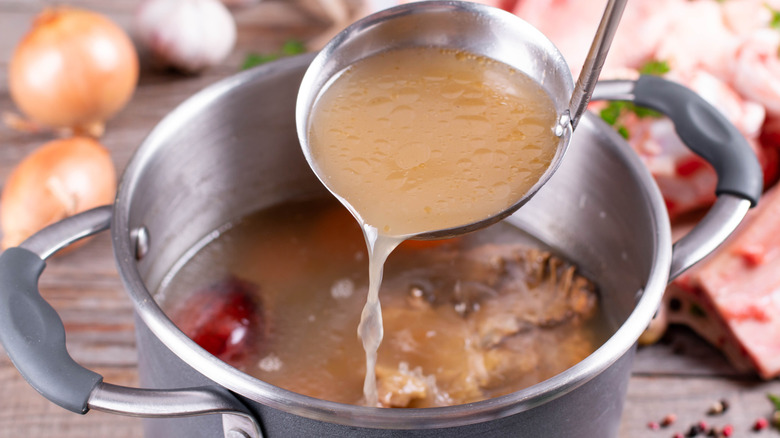For Tastier French Onion Soup, Should You Use Broth Or Stock?
Paris is responsible for many great creations: cinema, haute couture, but perhaps its most comforting masterpiece is a warm bowl of French onion soup. Savory, hearty, and a fixture of the Parisian bistro scene, a traditional bowl of this soup is made from slowly caramelized onions simmered in a broth or stock, topped with a toasty crouton, and finished with gooey, melted cheese broiled until brown and bubbly. But what's the best base for that soul-warming bowl — broth or stock? To find out, Food Republic spoke with Vicky Hadley, food blogger and recipe developer at Little Chef Within, who revealed that stock comes out on top.
Before diving deeper, it's worth clarifying the difference between broth and stock. Stock is made by simmering bones and connective tissues with aromatics for several hours, while broth is made by simmering meats and vegetables. Due to differences in ingredients, "[Stock is] naturally richer," Hadley explained. "Broth will still work, but it's lighter and doesn't give you that full body flavor!"
There are many kinds of stock, each with its own flavor profile, but for French onion soup, "Go with beef stock because it pairs so great with the sweetness of the onions," Hadley recommended. "Chicken stock can be used too if you want something milder, but vegetable stock needs a little help with extra seasoning to get close to that same depth." Beef stock is a staple in hearty French cuisine; just look at boeuf bourguignon. It's rich, full-bodied, and perfectly matches the decadence of French onion soup, making it the natural choice for this timeless Parisian comfort dish.
How to make broth taste like stock
The choice between broth and stock significantly affects both the taste and texture of French onion soup, and both have their own unique merits. "Stock makes the soup taste richer and gives it that amazing, velvety texture," Vicky Hadley told us. "Broth makes a somewhat cleaner[-]tasting soup where the onions really stand out more." The difference comes from how each base is made, with the bones and connective tissue used in stock releasing gelatin and collagen, creating a thicker, silkier consistency that adds body to the soup. Opting for the lighter and clearer broth replaces some of the richness and body with a lighter flavor profile, allowing the onions, which have been sweetened by caramelization, to shine.
Stock can be brought in cubes or powdered form, but homemade is always best. If you've not got any stock on hand but do have some leftover broth, you can boost it to give it the depth of stock. "I like to simmer it a little longer to thicken the flavor," Hadley told us. There are also several ingredients you can add to deepen the taste. Alongside choosing the correct onions, "A splash of Worcestershire sauce or a beef bouillon cube works great for a quick boost," Hadley added. "You can even stir in a spoonful of tomato paste or a little soy sauce to make it taste heartier." Have a go at adding extra ingredients to your French onion soup to enrich the flavor; maybe a hearty red wine to deglaze the pan after caramelizing the onions, or consider simmering aromatic French-style herbs like rosemary, thyme, or bay leaves in the broth.


